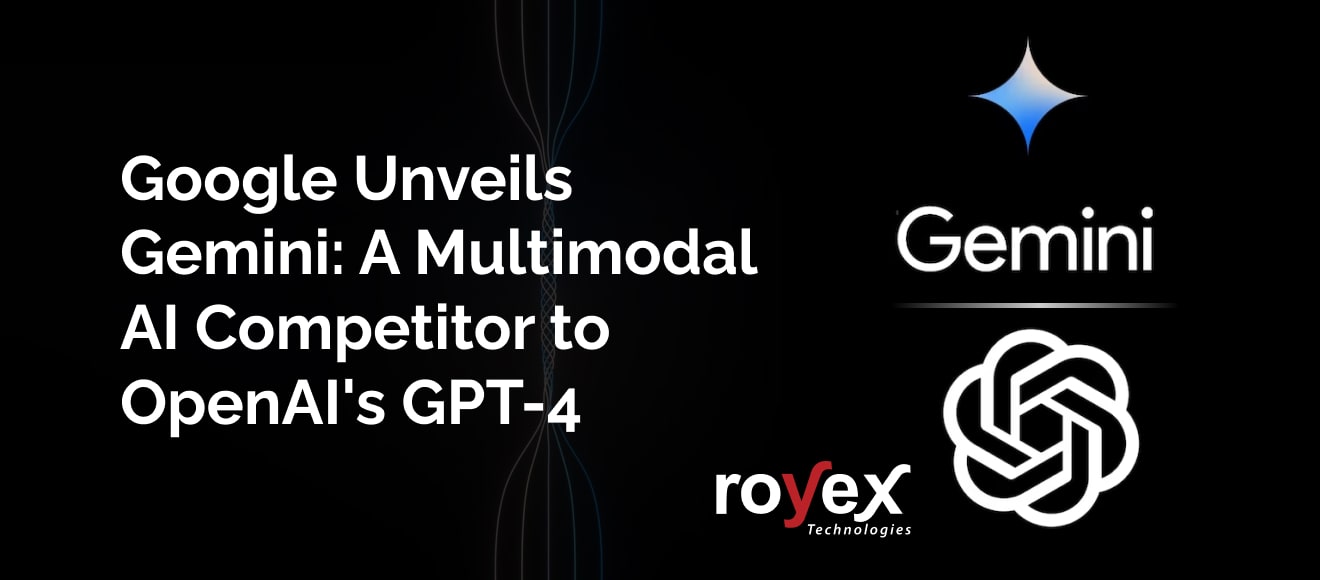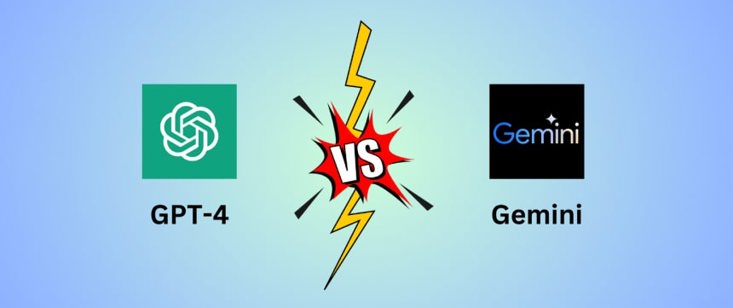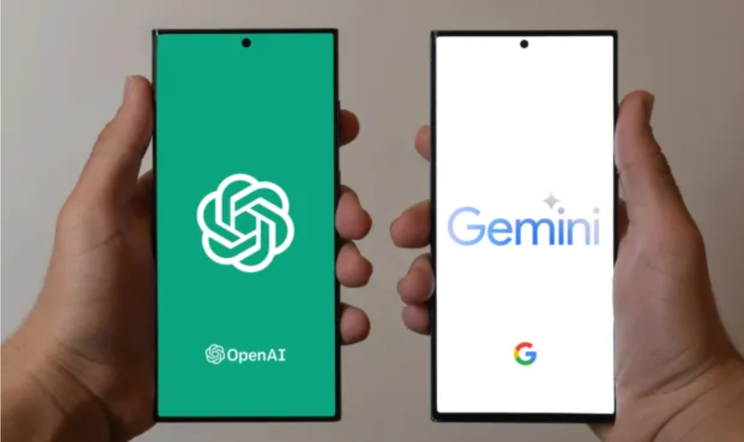
Google Unveils Gemini: A Multimodal AI Competitor to OpenAI's GPT-4
In a groundbreaking announcement, Google announced the launch of Gemini, a robust multimodal AI model family aimed at challenging the dominance of OpenAI's GPT-4, the engine behind the paid version of ChatGPT. Google boldly claims that Gemini's largest version surpasses current benchmarks on 30 of the 32 widely used academic benchmarks in the realm of large language model (LLM) research and development. This release follows the aspirations set by PaLM 2, an earlier AI model by Google, to compete with the capabilities of GPT-4.
Global Availability and Multimodal Capabilities
Like its counterpart GPT-4, Gemini is designed to handle multiple types of input, making it a true multimodal AI. Its capabilities span text, code, images, and audio, setting the stage for solving problems, offering advice, and answering questions across diverse fields. A specially tuned English version of the mid-level Gemini model is already available in over 170 countries, integrated into the Google Bard chatbot. However, due to potential regulatory issues, it is not accessible in the EU or the UK.
Gemini Sizes and Specialized Applications
Gemini comes in three distinct sizes: Ultra, Pro, and Nano, each tailored to different purposes. Ultra targets highly complex tasks, Pro aims at scaling across a wide range of tasks, and Nano is designed for on-device tasks, such as those on Google's Pixel 8 Pro smartphone. The parameter count determines their complexity, with Nano optimized for local consumer devices and ultra-demanding data center hardware for operation.
Performance and Benchmarking
Gemini's mid-level model is currently available for public use, with Google Bard now powered by the specially tuned Gemini Pro. Initial testing suggests superior performance compared to its predecessor, PaLM 2. Google asserts that Gemini is not only more scalable but also more efficient when run on Google's custom Tensor Processing Units (TPU). The models reportedly run significantly faster on TPUs compared to earlier, smaller models.
Coding Excellence and Specialized Versions
Gemini's prowess extends to coding, with the introduction of AlphaCode 2, a coding-centric version that excels in solving competitive programming problems involving complex math and theoretical computer science. Google's emphasis on coding suggests Gemini's potential as a versatile tool for developers and programmers.
Gemini's Role in the Future of Google
According to Google CEO Sundar Pichai, Gemini marks the beginning of a new era in AI at Google—the Gemini era. Pichai expressed his excitement about the opportunities Gemini will unlock globally. Google envisions Gemini being tightly integrated into its products, becoming a transformative force across various domains.
The model's integration into Google's products is already underway, with Bard powered by Gemini Pro and new features introduced for Pixel 8 Pro users through Gemini Nano. Developers and enterprise customers can access Gemini Pro through Google Generative AI Studio or Vertex AI in Google Cloud starting on December 13th. While currently available only in English, Google plans to integrate Gemini into its search engine, add products, Chrome browser, and more, on a global scale.
Gemini's Future Integration and Deployment Plans

Gemini is not just a single model; it comes in multiple versions. Nano, for offline use on Android devices, Pro, powering various Google AI services and Bard, and Ultra, the most powerful LLM designed for data centers and enterprise applications. Google plans to integrate Gemini into its search engine, add products, the Chrome browser, and more on a global scale. The release of Nano and Pro is already in progress, with Ultra slated for next year.
Cautious Optimism and Safety Measures
Despite the competitive landscape, Google emphasizes a cautious approach, particularly as we approach the prospect of artificial general intelligence (AGI). Safety and responsibility are paramount, with internal and external testing and red-teaming ensuring Gemini's reliability. Google is taking a slow and controlled approach to the release of Ultra, treating it as a controlled beta with a focus on uncovering potential issues before widespread deployment.
Gemini Versus GPT-4: Benchmarking and Advantages

In a direct challenge to OpenAI's GPT-4, Google claims superiority in a thorough analysis, stating that Gemini outperforms GPT-4 in 30 out of 32 benchmarks. The emphasis is placed on Gemini's ability to understand and interact with video and audio, aligning with its multimodal design philosophy.
Vision and Purpose
-
Gemini: Aims to make AI helpful worldwide, creating opportunities, driving innovation, and bringing economic progress.
-
GPT-4: Emphasizes safety, usefulness, and creating more advanced language models with enhanced creativity and problem-solving capabilities.
Multimodality
-
Gemini: Multimodal model understanding and combining text, code, audio, image, and video; optimized for different sizes from Ultra to Nano.
-
GPT-4: Introduces visual input capabilities, processing and generating responses based on visual information.
Performance
-
Gemini: Gemini Ultra surpasses state-of-the-art performance on various benchmarks, including language understanding and multimodal tasks.
-
GPT-4: Demonstrates improvements over ChatGPT in domains like problem-solving accuracy and standardized test rankings.
Reasoning Abilities
-
Gemini: Exhibits sophisticated multimodal reasoning, excelling in math, physics, and coding tasks.
-
GPT-4: Outperforms ChatGPT in advanced reasoning tasks, such as scheduling meetings based on multiple individuals' availability.
Safety and Alignment
-
Gemini: Comprehensive safety evaluations, including bias and toxicity analysis, rigorous testing, and collaboration with external experts to mitigate potential risks.
-
GPT-4: Safety and alignment improvements result in a reduced likelihood of responding to disallowed content requests and an increased likelihood of producing factual responses. OpenAI continuously improves based on real-world usage and feedback.
Applications and Partnerships
-
Gemini: Integrated into Google products like Bard and Pixel, enhancing reasoning, planning, and writing capabilities. Accessible to developers and enterprise customers through the Gemini API.
-
GPT-4: Collaborates with organizations like Microsoft Bing, Duolingo, Stripe, Morgan Stanley, exploring potential applications in language learning, accessibility, user experience, and knowledge management.
Conclusion
Gemini marks Google's strategic move to reclaim its position in the AI landscape, competing directly with OpenAI's GPT-4. With its multimodal capabilities, benchmark superiority, and versatile deployment strategies, Gemini aims to redefine the AI landscape. As Google positions Gemini to integrate seamlessly into its ecosystem, the tech giant anticipates the model's transformative impact on a global scale, envisioning the Gemini era as a pivotal chapter in the company's history.






